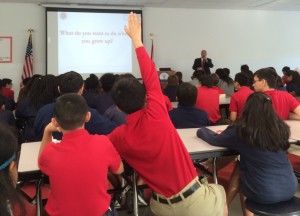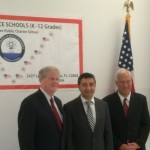Florida State University is on a well-known quest to reach the top 25 in national academic rankings of public universities.
That helps explain why its new president, John Thrasher, was listening to students at the Orlando Science School as they talked about spending Saturdays in the robotics lab, and doing experiments with self-heating polymers and RFID transmitters.

During a visit to the school last week, Thrasher said the university’s plan calls for strengthening its STEM programs.
That behooves it to attract students with solid foundations in math and science who might be interested in undergraduate research, or in pursuing careers in well-paying fields like engineering — the kind of students who have gravitated to the Central Florida charter school.
“This is an amazing school,” he told a group of upperclassman packed into the school’s media center. “You all are getting an opportunity that’s pretty exclusive, and I hope you make the best of it.”
Thrasher, a former state lawmaker now nearly five months into his presidency, accompanied Paul Cottle, an FSU physics professor who makes the rounds at schools across the state, promoting the high-level math and science courses he says are crucial to success in college.
Each year, as Cottle has shown on his blog, thousands of Florida students graduate high school without taking courses like physics and calculus. Research has found disparities in high school preparation hinder the progress of black and Hispanic students in science, technology, engineering and math. Around the state, he has found are pockets of success where schools have made science a priority.
Yalcin Akin, the Orlando school’s founder, said he had seen a need for more STEM-focused public schools since he was working toward his Ph.D. in materials engineering at Florida State.
Since the school was first profiled by redefinED, it has grown to enroll more than 1,000 students at its elementary and secondary campuses. It celebrated its first graduating class, boasting that all its alumni were accepted into college. Next school year, it is set to expand into neighboring Seminole County.
Last year, the school also won its third-straight state title at the Science Olympiad. It typically fields multiple teams in the science competitions, which basically enjoy the status of a varsity sport.
“FSU has a football team,” Akin said. “We have Science Olympiad.”
The school has added a seventh period for extracurricular activities, many of which help reinforce its science-loving culture (although there are a few poetry awards in its crowded case of trophies from academic competitions).

“It allows you to expand your knowledge,” said eighth-grader Yashasvi Bhat, adding that he likes having a chance to “actually build stuff.”
Bhat had just finished showing off his award-winning science project, in which he looked for materials that could block identity thieves from using radio-frequency identification to swipe people’s credit-card information.
If one charter school is finding ways to help students cultivate an interest in science, FSU researchers might soon have a role finding ways to replicate that success in other places.
Under a plan moving through the Legislature, the university could soon house a new Institute for Charter School Innovation. Among other things, the institute would be tasked with looking at charter schools’ management and instructional practices, and finding ways they can improve.
Thrasher said he had discussed the possibility of creating the institute with lawmakers and was “excited” about it.
The university already authorizes its own well-regarded charter schools — a developmental research school in Tallahassee and an elementary school in South Florida.
Thrasher has supported Florida’s charter school movement since he was in the state House, when Gov. Lawton Chiles approved the law authorizing the state’s first charters. He served as Speaker during Jeb Bush’s hard-charging first two years as governor.
He told a group of parents at Orlando Science School his main interest in the K-12 education system now is ensuring students who arrive at the state’s universities are ready to excel.
“Parents want choices,” he said. “I hope it strengthens the public schools. It strengthens the kind of folks who come to our universities.”


